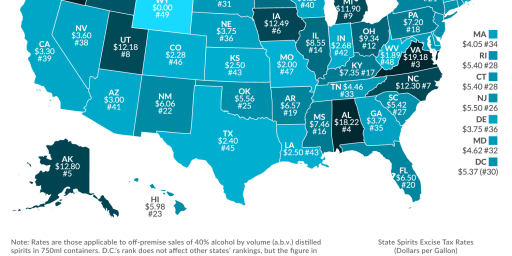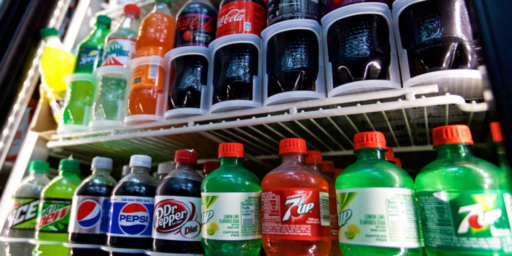Alcopop Taxes Fizzle As Manufacturers Outsmart Lawmakers
 The attempt by California to tax sweet malt liquors as spirits in order to extract higher tax revenues under the guise of protecting minors from themselves isn’t working out so well.
The attempt by California to tax sweet malt liquors as spirits in order to extract higher tax revenues under the guise of protecting minors from themselves isn’t working out so well.
Substance-abuse foes cheered last year when state officials cracked down on sweet, sometimes fizzy, intoxicating drinks such as Mike’s Hard Lemonade that — save for their alcohol content — bear a remarkable resemblance to soda pop.
The sugary beverages had long been taxed as flavored beers. But state authorities reclassified them as liquor, raising the levies on a six-pack by a factor of 16 to match the rate consumers pay on vodka, rum and other distilled spirits. The move was supposed to generate $38 million in annual revenue for the state.
Now the numbers are in: The state has collected about $9,000 since the new tax rate kicked in Oct. 1. Some officials and activists suspect fraud.
Beverage makers admit they aren’t paying the new taxes. They say they don’t have to because they have reformulated the drinks — more than 6,000 varieties — to transform them into simple beers by limiting the amount of distilled spirits they contain. They won’t explain how. The formulas, they say, are trade secrets. And beverage-industry officials and federal regulators say there are no tests to determine how much distilled spirits the drinks contain.
Kevin Drum is amused by this, as am I. He’s mostly tickled by the “brazenness” of the companies while my joy is derived from making the lawmakers look silly. Such is the nature of bipartisan consensus.
As an aside, I always presumed Zima and Mike’s were aimed at chicks, not kids.
Photo by Flickr user faeryboots, used under Creative Commons license.






This dovetails nicely with my point from a few posts ago about Americans’ history of tax compliance (or lack thereof). There are strong incentives to avoid such taxes and avoid them we will. Or evade as the case may be.
It also should highlight for people why a substantial national sales tax will never work here. A tax high enough to make any real difference will simply create a large black market.
That’s probably right, Dave. Indeed, it’s the nature of almost any attempt to legislate moral behavior: People will either ignore the law or find creative loopholes.
This law was supposed to tax immoral behavior, not moral behavior.
Though I think you may be inadvertently on to something: Let’s tax moral behavior. Moral people aren’t likely to stop being moral, just because it’s taxed. Also, being moral people, they’re less likely to ignore or evade their tax liability. This should be politically easy to pass, since it won’t tax most politicians, being naturally immoral persons to begin with.
(The above was pure sarcasm, but when I went to think of amusing ideas for “taxing morality”, I found that they were all to close to reality. Irony fails me here.)
The weirdest personal example of this is when I bought a replacement dishwasher a few years ago. One company treated the transaction as a sales transaction, for which a sales tax was charged. The second company treated the same transaction as a service transaction, for which no sales tax was charged. In fact, the second company received more money, but I paid less.
Dunno about Zima, but Mike’s is billed as hard lemonade….sublibidimal advertising?
I have to admit as a recovered home brewer, I’m curious how one simply converts a fruit beverage into a beer without (apparantly) changing the nature of the product.
Going back to my days as an underage drinker, I think you are missing the point on Zima James 🙂
Zima and Alcapops were designed for the 17 year old girl who did not like beer and could not get her hands on peppermint schnapps on a Saturday night, but whose friend (me) had an excellent connection at a liquor store which routinely sold Zima at a discount —
Much like Boone’s Farm or Arbor Mist or any other sweetly fortified wine-like products, they were aimed at novice drinkers who either do not like bitter or dry beverages….
I too would like to second PD Shaw’s question on the technical aspects….
I think slate had an article about the history of Zima, which initially was not aimed at female drinkers at all.
Here we go. Definite worth a read:
http://www.slate.com/id/2204596/
Generally ‘fun’ drinks like these tend to get a bad rep. Sparks is down for the count, if anyone is familiar with that, after governors of a few states got together and threatened litigation due to reports of a more than a few kids getting drunk off it.
As I recall and talking about avoiding taxes, there was a story last week about an increase in the number of large companies going oversees to avoid higher US taxes which results in lower revenue for the US. I was surprise we haven’t chase all the “evil†big companies away already.
“It also should highlight for people why a substantial national sales tax will never work here. A tax high enough to make any real difference will simply create a large black market.”
This is spot on Dave and please you should write an expanded post explaining this to people. A NST large enough to collect revenue to replace income tax would create a huge black market. There is a black market now in those items that have substantial taxes like liquor and cigarettes and a NST would extend that to everything.
It is far easier for a lot more people to figure out ways around a sales tax then there are for most people to figure out ways around an income tax (tax avoidance for the very wealthy has always been a matter of the will to do it rather then any accounting or legal issues). On the other hand creation of phony “businesses” created for the purpose of sales tax avoidance would flourish. The reason sales tax is even collectible to a large extent is because the amount of $$$ on each transaction is low relative to the penalties.
While I’m all for reforming the tax system a National Sales Tax would be a disaster in so many ways it’s not funny.
Resolved: Obama’s tax increases will not reap the benefits advertised………people being what they are.
Anyone surprised?